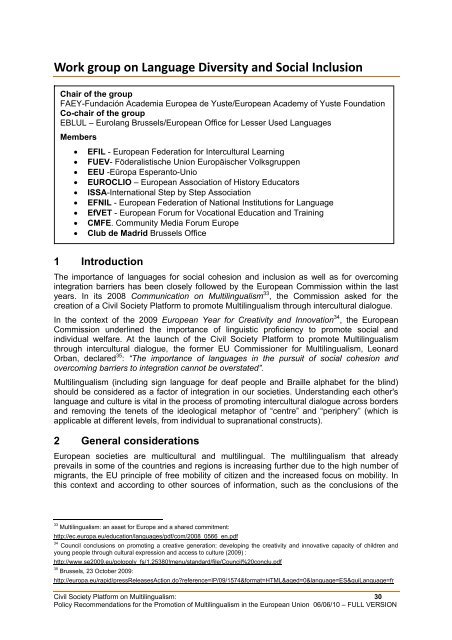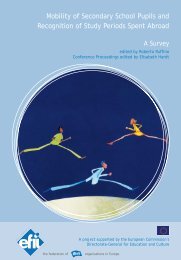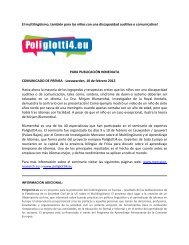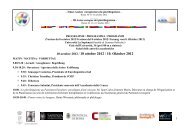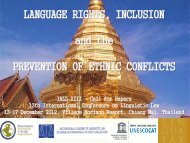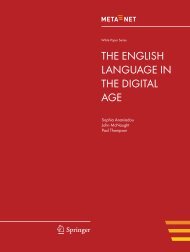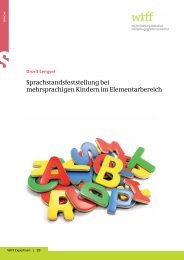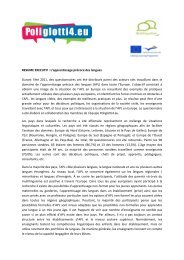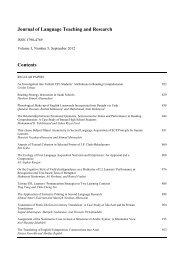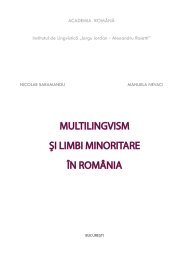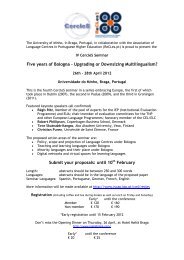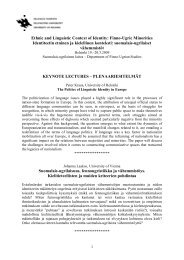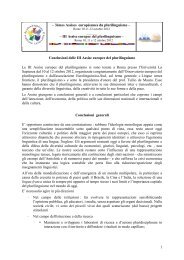Work group on Language Diversity and Social InclusionChair of the groupFAEY-Fundación Academia Europea de Yuste/<strong>European</strong> Academy of Yuste FoundationCo-chair of the groupEBLUL – Eurolang Brussels/<strong>European</strong> Office for Lesser Used LanguagesMembers EFIL - <strong>European</strong> Federation for Intercultural Learning FUEV- Föderalistische Union Europäischer Volksgruppen EEU -Eŭropa Esperanto-Unio EUROCLIO – <strong>European</strong> Association of History Educators ISSA-International Step by Step Association EFNIL - <strong>European</strong> Federation of National Institutions for Language EfVET - <strong>European</strong> Forum for Vocational Education and Training CMFE. Community Media Forum Europe Club de Madrid Brussels Office1 IntroductionThe importance of languages for social cohesion and inclusion as well as for overcomingintegration barriers has been closely followed by the <strong>European</strong> <strong>Commission</strong> within the lastyears. In its 2008 Communication on Multilingualism 33 , the <strong>Commission</strong> asked for thecreation of a Civil Society Platform to promote Multilingualism through intercultural dialogue.In the context of the 2009 <strong>European</strong> Year for Creativity and Innovation 34 , the <strong>European</strong><strong>Commission</strong> underlined the importance of linguistic proficiency to promote social andindividual welfare. At the launch of the Civil Society Platform to promote Multilingualismthrough intercultural dialogue, the former EU <strong>Commission</strong>er for Multilingualism, LeonardOrban, declared 35 : “The importance of languages in the pursuit of social cohesion andovercoming barriers to integration cannot be overstated”.Multilingualism (including sign language for deaf people and Braille alphabet for the blind)should be considered as a factor of integration in our societies. Understanding each other'slanguage and culture is vital in the process of promoting intercultural dialogue across bordersand removing the tenets of the ideological metaphor of “centre” and “periphery” (which isapplicable at different levels, from individual to supranational constructs).2 General considerations<strong>European</strong> societies are multicultural and multilingual. The multilingualism that alreadyprevails in some of the countries and regions is increasing further due to the high number ofmigrants, the EU principle of free mobility of citizen and the increased focus on mobility. Inthis context and according to other sources of information, such as the conclusions of the33Multilingualism: an asset for Europe and a shared commitment:http://ec.europa.eu/education/languages/pdf/com/2008_0566_en.pdf34Council conclusions on promoting a creative generation: developing the creativity and innovative capacity of children andyoung people through cultural expression and access to culture (2009) :http://www.se2009.eu/polopoly_fs/1.25380!menu/standard/file/Council%20conclu.pdf35Brussels, 23 October 2009:http://europa.eu/rapid/pressReleasesAction.do?reference=IP/09/1574&format=HTML&aged=0&language=ES&guiLanguage=frCivil Society Platform on Multilingualism: 30Policy Recommendations for the Promotion of Multilingualism in the <strong>European</strong> Union 06/06/10 – <strong>FULL</strong> <strong>VERSION</strong>
latest Eurobarometer 36 on language use and competence in Europe, there is still a lot of workto do to foster multilingualism and its social inclusion perspective.According to the last Eurobarometer statistics on language use and competence in Europe 37 ,about 50% of EU citizen say they are able to maintain a conversation in at least onelanguage other than their mother tongue. Percentages vary among countries and socialgroups: 99% of the citizen from Luxembourg, 93% of Latvians and Maltese, and 90% ofLithuanians claim to know at least one language other than their mother tongue, whereas inHungary (71%), the United Kingdom (70%), Spain, Italy, and Portugal (64%) a great majorityspeak only their mother tongue. Men, youth and urban populations are more likely to speak aforeign language than women, elderly people and rural populations. These figures should betaken as a mere indicator of language competence since Eurobarometer statistics are basedon self-reporting, not on any objective testing. Kraus offers a more accurate image of thesituation, when he says:“The actual potential of English as a lingua franca is diminished for the present by thefact that only 20% of the 38% of EU citizen who claim to have a knowledge of Englishas a foreign language describe their ability as “very good” (i.e. less than 8% of thetotal). To put it bluntly, English may be a reliable medium for asking directions abroad,but that does not make it the linguistic cement of a transnational politicalcommunity”. 38Be that as it may, as pointed out some time ago by Ján Figel, former EU <strong>Commission</strong>er forEducation, Training, Culture, and Multilingualism 39 : “Languages are what makes us humanand Europe’s linguistic diversity is at the core of its identity”. In fact, multilingualism has beena typical feature of our continent throughout its history. According to the <strong>European</strong><strong>Commission</strong>, languages are a basic element for <strong>European</strong>s who wish to work, studyand live together 40 . Languages are at the core of the idea of unity in diversity, whichcharacterizes the <strong>European</strong> Union. In this context, we have to consider the increasinglymulticultural and multilingual nature of <strong>European</strong> societies not only because of themultilingualism that prevails in some of the countries and regions or because of the highnumber of immigrants, but also because of intensive exchanges (tourism, education,science, culture) favoured by the EU principle of free movement of citizen (implemented inpolicies and programmes such as Schengen, Erasmus, Socrates, the Bologna process). Oneof the main features of the multi-layered nature of <strong>European</strong> citizen today is their linguisticand cultural variety, indeed one of the most valuable parts of our common (or uncommon)<strong>European</strong> heritage, which is worth to preserve and promote. We need languages tounderstand each other, our neighbours, particularly in border regions, as well as our partnersinside and outside the EU.Promoting a “second mother tongue” reinforces multilingualism and intercultural dialogue,according to the conclusions reached by The Group of Intellectuals set up to advise the<strong>Commission</strong> on the contribution of multilingualism to Intercultural Dialogue 41 . Facilitatingintercultural dialogue through the learning of other languages is a key factor in thepromotion of social inclusion. It is not simply an anecdotal question of being able to36Special Eurobarometer 243/ Wave 64.3 – TNS Opinion & Social “<strong>European</strong>s and their Languages”- February 2006:http://ec.europa.eu/education/languages/pdf/doc631_en.pdf37Special Eurobarometer 243/ Wave 64.3 – TNS Opinion & Social “<strong>European</strong>s and their Languages”- February 2006:http://ec.europa.eu/education/languages/pdf/doc631_en.pdf38Kraus, Peter J., 2008. A Union of Diversity: Language, Identity and Polity-Building in Europe, p 155. Cambridge UniversityPress.39Ján Figel, Brussels, 22 November 2005 on the occasion of the launch of the new web portal of the EC to promote languagesin Europe.40http://europa.eu/languages/41A Rewarding Challenge - How the multiplicity of languages could strengthen Europe:http://ec.europa.eu/education/languages/archive/doc/maalouf/report_en.pdf andhttp://europa.eu/rapid/ pressReleasesAction.do?reference=IP/08/129&format=HTML&aged=1&language=EN&guiLanguage=enCivil Society Platform on Multilingualism: 31Policy Recommendations for the Promotion of Multilingualism in the <strong>European</strong> Union 06/06/10 – <strong>FULL</strong> <strong>VERSION</strong>


